- Home
- Joy Fielding
When I Looked Away Page 3
When I Looked Away Read online
Page 3
Gail had to think for several seconds, her mind running back through the years. “Uh, almost thirteen years.”
“Do you mind my asking why you were divorced?”
“There were a lot of reasons, I guess. We were very young, very different. Mark wasn’t really ready to settle down. He had . . . he had other women.” Lieutenant Cole looked up from his notepad. “Women,” Gail repeated. “Not children. Believe me, his taste in women is anything but puerile.”
“What was his attitude when you remarried?”
Gail shrugged. “He wished me well. I’m not sure what you want me to say.” Jack’s hand gripped hers tightly.
“How about his relationship with his daughter?”
“He loves Jennifer. He’s a wonderful father to her.”
“How did he feel about Jack replacing him?”
Gail stared into her husband’s eyes. “I think he might have been a little uneasy initially,” she began, “but after he saw that Jack had no intention of trying to replace him, as you say, he relaxed. Jack and Jennifer get along beautifully. She loves him and he loves her, but Mark is her father, and she knows that.”
“How did Mark feel when you had a child with another man?”
Gail tried to recall Mark’s reaction. “I don’t remember,” she said at last. “I don’t think he felt too much about it one way or the other.”
“He wasn’t jealous?”
“Not that I know of. Why would he be jealous?”
“You don’t think that he harbored any feelings of revenge?”
“Revenge? For what? I don’t understand what you’re getting at.”
“Take it easy, Gail,” Jack cautioned.
“What’s he trying to say?” Gail asked her husband as if the police lieutenant were no longer present.
“Your ex-husband has no verifiable alibi for the time your daughter died,” Lieutenant Cole said simply.
“He doesn’t need an alibi,” Gail protested weakly, trying to come to grips with this new information.
Lieutenant Cole checked his notes. “He says he was photographing a woman in West Orange from two to three o’clock. His next appointment was at four, twin boys not too far from where you live.” He paused to let these facts sink in. “It doesn’t take an hour to get from West Orange to Livingston.”
“You’re wasting your time, Lieutenant,” Gail told him, feeling her eyelids growing heavy.
“What about Jennifer’s boyfriend?”
“Eddie?” Gail asked, her amazement jolting her awake again.
“Eddie Fraser,” Lieutenant Cole pronounced, reading from his notes. “Age sixteen, eleventh-grade student, straight A average.”
“Eddie and Jennifer are in the same class,” Jack embellished. “They’ve been going steady for almost a year.”
“Eddie didn’t do it, for God’s sake,” Gail whined, panic mounting in her chest. “You’re wasting valuable time. Eddie is a nice boy. He’s a serious student. He wants to be a doctor or a lawyer. He’s crazy about Jennifer. He’s crazy about Cindy.” She stopped abruptly.
“Did you ever notice anything untoward in his behavior with Cindy?”
“Untoward? What do you mean?”
“Did you ever see him staring at her in a way that made you uneasy? If they played together or roughhoused around a bit, did you ever notice his hands brushing up against her legs? Maybe a pat on the posterior that lasted a touch too long . . .”
“Stop it!” Gail cried. “This is crazy. Eddie didn’t hurt Cindy! He’s a kind, gentle boy, always polite, always helpful and sweet.” Gail looked to Jack for confirmation. “Isn’t he?” Jack nodded silently. “We like Eddie. He likes us. I mean, initially, we weren’t thrilled about the steady arrangement. We thought that Jennifer was too young to get involved with one boy, but he was so nice that we decided she could do a lot worse, and probably would in years to come, because after all, they are only sixteen. We didn’t want to encourage their . . . passion,” she stumbled, “by trying to deny it. We made certain conditions. No middle-of-the-week dating, home by one o’clock on Friday and Saturday nights. Eddie was very agreeable. We’ve never had any trouble with him. Don’t you see?” she asked, looking back at the young lieutenant. “It can’t be Eddie. He loved Cindy like she was his own little sister. I know that’s how he thought of her.”
“He has no alibi for the time period involved,” Lieutenant Cole said, as he had said earlier in the conversation about Mark Gallagher. “He claims to have gone right home after school to study for a test.”
“If that’s what he says,” Gail protested, “that’s what he did.”
“Unfortunately, there was no one else at home at the time to back him up.”
“This is ridiculous,” Gail said, firmly closing her eyes. She would not listen to any more of his questions if he wasn’t going to listen to her answers. Eddie was not a child molester. He certainly wasn’t a killer. Neither was Mark Gallagher. The police were wasting their time when they could be out trying to find the man responsible.
“What are you doing to find the killer?” she asked, and knew immediately it was the next morning, though no one seemed to have moved. The sun was hitting the floral arrangement in the windowsill at a wider angle; the nurses looked crisper, more efficient, their actions more defined. They traveled from point A to point B as if there were really a reason for doing so. Nobody had thought to tell them that there were no reasons.
Gail had spent most of the night in the park, confronting the faceless killer of her young child, wanting to kill him but unable to do so, missing the opportunity to avenge her child’s death, to alleviate some of her guilt. She knew it was the next morning because, if it were possible, she felt even more tired than she had the night before.
“What are you doing to find the killer?” she repeated, not sure whether the lieutenant had heard her the first time, whether she had, in fact, asked the question aloud.
Lieutenant Cole’s assurances were quick and automatic. “We’re doing everything we can,” he stated, almost by rote. “We have all our available men working on the case; we’ve rounded up all known sex offenders in the area. Your husband’s already gone through our file of photographs to see if anyone looks familiar. We’d like you to do the same when you’re feeling a little stronger.”
“I’ll look now,” she told him, and he immediately produced several sheets of photographs. Gail slowly perused each face, some young, some not so young, some distinctly unpleasant in appearance, others quite good-looking. No one was familiar. She handed the photographs back to Lieutenant Cole. “They’re all so . . . ordinary,” she said at length, surprised by the word. She had expected evil to be more striking in appearance.
“We’re conducting numerous tests,” Lieutenant Cole continued.
“ ’Tests’? What kind of tests?”
“The killer left a pretty clear footprint in the mud, which we’re making a cast of. Then there are saliva tests, blood tests, semen tests.”
The full impact of these words hit her square in the stomach like a fighter’s fist. She felt the bile that lay lodged in her throat beginning to move up to her mouth, and in the next instant she was retching violently into the bedpan. Within seconds a nurse was beside her, holding her head, and the lieutenant was gone.
Sometime later, her head back against the pillows, Jack’s hand still in hers, the room quiet except for the sound of their dull breathing, she wondered how she could still be alive when she felt so altogether dead inside.
*
The reporters were waiting for her when she left the hospital, hurling their questions against her like hard, fast pebbles, surrounding her with their bodies and their cameras.
“Do you have any idea who might be responsible?”
“Have the police given you any indication in which direction they’re heading?”
“Are there any leads?”
Just like on television, she thought, without answering them.
/> “How do you feel about the death penalty?”
Someone had answered, and she was surprised to see in later newscasts that it had been she who had answered, that she was not out for blood or vengeance, that she wanted only for the killer to be caught, and that she was confident he would be. Where had she found the strength to say that?
Jack fixed his eyes on the road, his hands covering hers, as they sat in the rear of the police car on the drive back to their home. Lieutenant Cole sat in the front seat beside the driver. There might be more reporters waiting at the house, he warned them. Gail nodded but said nothing, her mind on the results of the autopsy.
The police had informed her, as she had struggled with the image of her beautiful child being cut open in the name of acquiring evidence, that Cindy Walton had been sexually assaulted and then manually strangled by an unknown assailant on April 30 at approximately three-thirty in the afternoon, essentially the same information they had given her before they thought they knew anything at all. In two days, despite constant assurances to the contrary, they were no further ahead, no closer to catching the man responsible. They had only confirmed what they had known all along. But her small daughter’s body had undergone the further indignity of the coroner’s knives, the trail her killer had left was two days older, and despite her statements to the reporters that the police were sure to catch the man responsible, Gail wasn’t sure at all. The fact that their two prime suspects were men she knew to be absolutely incapable of such an act did nothing to increase her confidence. The police would never find the killer, she acknowledged silently, staring at Lieutenant Cole’s straight shoulders.
He was a nice enough man; he meant well; he obviously wanted to help. But Cindy was just a case to him, as she was to all the others, a sad, even tragic occurrence, but not an uncommon one in today’s world. Her death had touched their lives, perhaps, but it hadn’t changed them. The police would do all they could, but in the end, what could they do? She’d read enough to know that after a few days, a killer’s trail grows increasingly cold. There was very good reason to believe that if the police hadn’t found the murderer by now, they never would.
The thought of her daughter’s killer evading capture, of his walking freely through the city streets, disrupted the buzz of her most recent sedative. The final obscenity, she thought, her mind curling itself around the corners of a plan, something she could never permit. If the police could not find her daughter’s killer, she would have to find him herself.
This realization surprised her only slightly, as if her unconscious mind had been aware of it all along. It was simple really. She would avenge her daughter’s death by bringing to justice the man who’d killed her. She would not remain the helpless figure of her dreams.
But first she would give the police a chance, she decided, leaning against Jack, and at the same time give her body a chance to renew its strength. She looked out the side window.
She would give them sixty days.
Chapter 4
They were waiting for her when she walked through the front door, their faces like the tortured wood etchings of Edvard Munch, drained of the colors of life, frozen in grief and bewilderment.
“Mom,” Gail whispered, unable to say more as her mother’s arms surrounded her and their bodies trembled one against the other.
“My darling,” she heard her mother cry before she felt her body being pulled away by stronger arms.
“Daddy,” she sighed, feeling the word rush from her mouth. Her father, a big man with a deep tan, held her tightly against his chest, his head buried against her shoulder. He said nothing, and she recognized as the weight of his body pressed against hers, that she was supporting him as much as he was supporting her.
“Such a terrible thing,” he muttered. “Our beautiful little Cindy.”
Gail tried to move her head but couldn’t. Her father held her in too tight a grip. She felt suddenly straitjacketed, her arms pinned to her sides, unable to turn her head in either direction. Her father’s arms seemed to tighten their hold when she tried to move, and she felt like a small animal being slowly asphyxiated by a python, the snake’s coils tightening with each of its victim’s last desperate breaths. She couldn’t find any air. He was smothering her, squeezing the life right out of her. My God, Cindy, she screamed silently, is this how it felt? She pulled herself violently out of her father’s puzzled arms.
“They’ll find that son of a bitch,” her father said forcefully, “and if we’re lucky, somebody will shoot the bastard.”
“Dave,” her mother cautioned.
“They’ll find him,” her father continued, ignoring his wife’s admonition, “and then someone should kill the animal slowly. Shooting’s too good for the man. So’s gas, and the chair. They should cut off his balls and pull the rest of him apart with their bare hands. I could do it. I know I could do it.”
He sat down in a crumpled heap, his energy spent, his voice gone.
“Doing those things isn’t going to bring our Cindy back,” Gail’s mother said quietly, returning to her daughter and drawing Gail back into her arms.
“At least the animal wouldn’t be able to do this to anyone else,” her father said angrily. “At least they’d wipe his smile off the face of this earth.”
“I’m with you, Pop,” a voice said from a corner of the room. Gail looked past her mother’s shoulders at her younger sister Carol, who stood slim and pale. Gail felt herself drawn toward the young woman, and seconds later the two sisters were in each other’s arms. “Oh God, Gail, it’s so awful,” Carol cried softly.
“I know,” Gail gasped, feeling increasingly numb, the numbness spreading to her legs. “I need to sit down.” Her knees suddenly buckled.
Immediately, she was led toward the sofa, where many arms arranged pillows and leaned her against them. Her sister sat to one side of her, her mother to the other. Her father sat on the wing chair across from the sofa, his head in his hands. Jack remained standing, unable to move. He had no one to surround him, Gail realized. His father was dead; his mother, with whom Gail had a cordial, if distant, relationship, had yet to be located. Jack had been an only child, so there was no one else for him now. No one except herself, Gail realized, moving over to include him in their tight circle of grief. He walked quickly to sit down between her and her sister, but when he did, it was his arms that did the comforting. It was so like Jack, Gail thought, leaning her head against his broad chest.
They sat frozen for what felt like a very long time. Nobody spoke. In fact, there was nothing to say. The stranger in the bushes had said it all.
The knock on the door was quiet and tentative. Lieutenant Cole, whom Gail had not realized until now was present, went to answer it. Gail watched as her daughter Jennifer came running inside, and she stood up just in time to catch the teenager as she collapsed into her arms. Gail quickly covered her daughter’s wet cheeks with kisses, noticing out of the corner of her eye that Jennifer was not alone. Mark and Julie, Gail’s ex-husband and his wife, were with her. So was Jennifer’s boyfriend Eddie. Mark and Eddie, Gail thought, glancing at the lieutenant, his two prime suspects.
Mark and Julie were instantly at her side, Mark’s arms moving easily around her. He was taller than Jack; she had forgotten how much taller. But after only seconds pressing her head against his chest, she felt the same shortness of breath she had experienced when her father had held her, and she pulled away. She felt easier with Julie’s embrace.
“If there’s anything we can do,” Julie was saying, “anything at all, please don’t hesitate to ask. If you want Jennifer to stay with us . . .”
“Thank you,” Gail said sincerely, “I think she probably needs to be here right now, but I appreciate everything . . .”
“Do the police have any idea . . .?” Julie began, looking helplessly around her toward the lieutenant.
“They think Mark did it,” Gail laughed, her laugh startling everyone in the room. Had it really been as loud as
it sounded?
Gail looked toward Jennifer’s boyfriend. “And if it wasn’t Mark,” she said, hearing her voice echo loudly against her ears, “then it was you, Duane.” Why was everyone looking at her in so strange a manner? “Eddie,” she corrected herself, then began laughing at her mistake, thinking how the subconscious associations of the mind could be so interesting, so unexpectedly funny. She wondered if Lieutenant Cole, who was looking fairly uncomfortable at this moment, could see the humor of her mistake. Or was he too young to remember the early days of rock and roll?
Someone, she wasn’t sure who, led her back to the sofa and sat her down, lifting her legs up and propping a pillow behind her head. Someone else covered her with a blanket. Yet someone else gave her a drink of water. She heard the front door open and close and knew that some of the people in the room had left, but her eyes were shutting and it took too great an effort to open them to see who had gone. As she closed her eyes and allowed the monster fatigue that had been hanging onto her muscles for the last several days to envelop her, swallowing her whole, the last image she had was of her father, his tanned and lean body doubled over against itself, at least a decade older than when she had seen him the year before.
*
She opened her eyes to the sound of new voices.
“Hi,” her friend Laura said gently, trying to smile. “How are you feeling?”
Gail swung her feet off the couch and pushed the blanket away from her. “What time is it?” she asked, looking around, aware that it was dark outside and that her parents, sister and daughter were no longer in the room. Neither was the police lieutenant. Had they been there at all or had she dreamt them?
“It’s eight o’clock,” Jack told her, coming to her side. “Lieutenant Cole left some time ago. I sent everyone else out for dinner.”
“The flowers are from Nancy?” Gail asked, seeing the enormous arrangement of roses and carnations which sat on the glass coffee table. Jack nodded.
“Are you all right?” Laura asked.
Gail let out a long, deep breath. “I don’t know how I am. I feel so numb. I guess it’s all the drugs they’ve been giving me.”

 The Stranger Next Door
The Stranger Next Door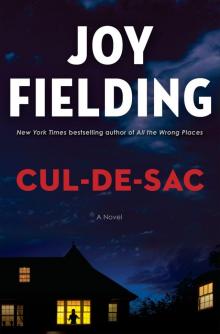 Cul-de-sac
Cul-de-sac The Final Act
The Final Act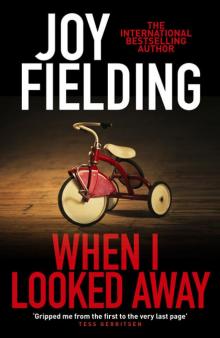 When I Looked Away
When I Looked Away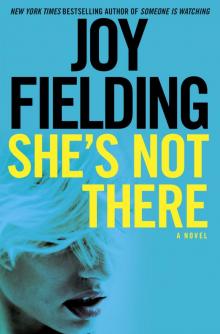 She's Not There
She's Not There All the Wrong Places
All the Wrong Places Now You See Her
Now You See Her Don't Cry Now
Don't Cry Now Good Intentions
Good Intentions Still Life
Still Life Lost
Lost The First Time
The First Time Whispers and Lies
Whispers and Lies The Other Woman
The Other Woman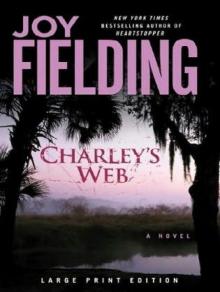 Charley's Web
Charley's Web Mad River Road
Mad River Road Puppet
Puppet Life Penalty
Life Penalty The Wild Zone
The Wild Zone Home Invasion
Home Invasion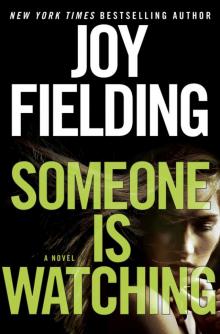 Someone Is Watching
Someone Is Watching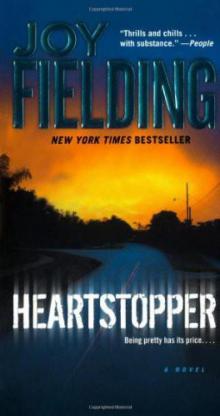 Heartstopper
Heartstopper See Jane Run
See Jane Run The Bad Daughter
The Bad Daughter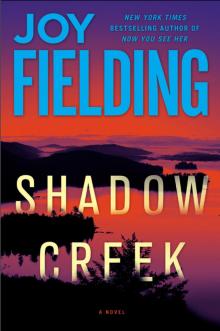 Shadow Creek
Shadow Creek Missing Pieces
Missing Pieces Kiss Mommy Goodbye
Kiss Mommy Goodbye Grand Avenue
Grand Avenue